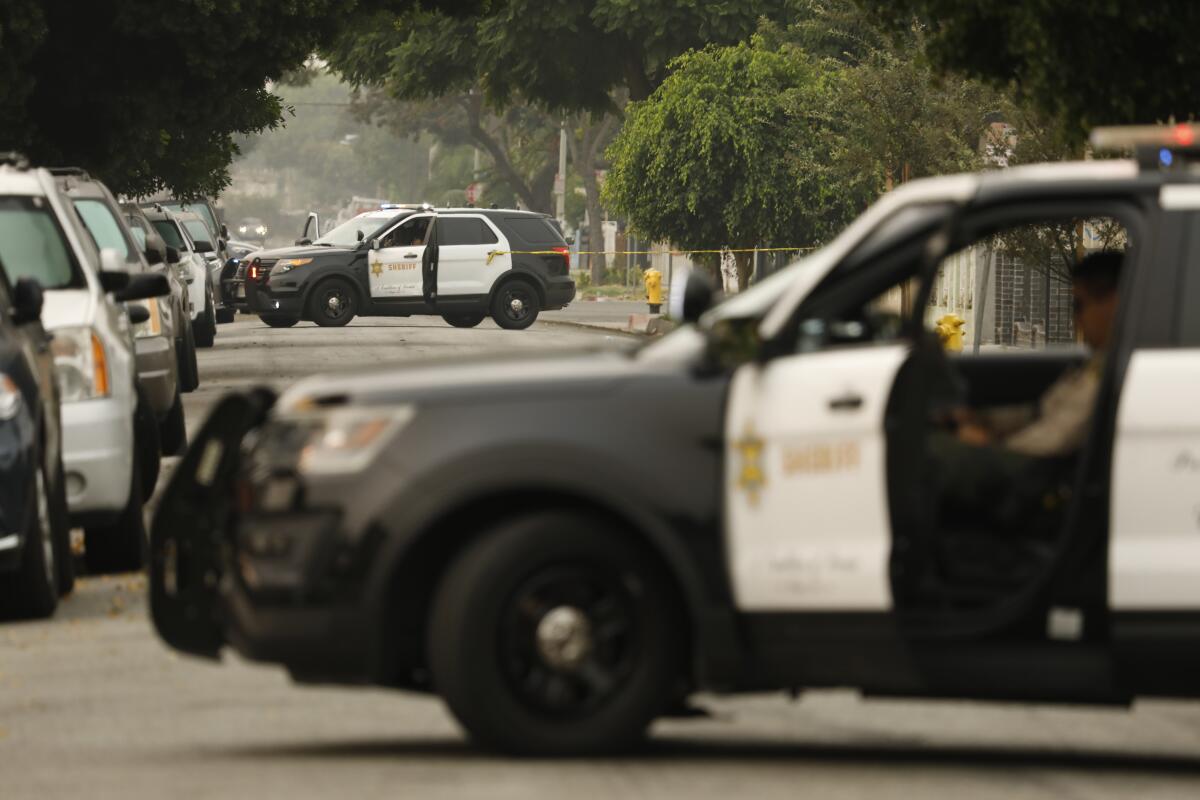Judge dismisses L.A. deputy’s retaliation lawsuit

A Superior Court judge this week threw out a lawsuit filed by a Los Angeles County sheriff’s deputy, ruling he had failed to back up his claim that he faced retaliation for reporting an assault by another deputy.
Deputy Austreberto Gonzalez sued L.A. County last year, alleging that after he anonymously reported the alleged assault by a member of what he called “a deputy gang” on another deputy, members of the alleged gang retaliated on him in several ways, including forcing him to respond to an excessive amount of calls for service. Gonzalez also claimed he was pushed out of his field training officer position.
Gonzalez “has no direct evidence of a causal link between any theoretical protected activity and his alleged loss of a trainee,” Judge William Fahey wrote in an 11-page ruling, in which the judge concluded Gonzalez had not been subjected “to an adverse employment action.” He also said Gonzalez had given contradicting statements about a transfer to another assignment.
The decision to toss the case came after Fahey in April scaled back its scope, allowing the deputy to claim only that he had reported a fight between two deputies and was then subjected to retaliation. The judge banned Gonzalez from introducing any evidence regarding the other deputies’ alleged involvement in the Executioners, a group of deputies in the sheriff’s Compton station, his attorney Alan Romero said.
Romero said Fahey’s refusal “to permit discovery with respect to The Executioners gang,” coupled with the lawsuit’s dismissal, amounted to a “cover-up.”
“We are highly confident that the Court of Appeals will reverse and allow discovery into the deputy gang that Gonzalez blew the whistle on,” Romero said in a statement.
After he filed a legal claim last year, Gonzalez testified in an unrelated federal civil rights lawsuit about the alleged activities of the Executioners. In a deposition, he testified that the tattooed deputies in the group have a stronghold over the Compton station and have committed an array of abuses, including fabricating stories about seeing crime suspects carrying guns.
Gonzalez said in the deposition that about 15 to 20 deputies are members of the Executioners, and that others are prospective members who are “chasing ink” — a reference to the matching skull tattoos that members are allowed to get. Most members and prospects, he said, have been involved in high-profile shootings or beatings. Gonzalez said that after a shooting, members will have a party at a bar and call it a “998 debrief,” after the radio code deputies use when reporting they’ve been in a shooting.
Sheriff Alex Villanueva, who has said claims from inside and outside the department about the prevalence and danger of gang-like deputy groups are overblown, released a statement Friday saying Gonzalez is not a credible source.
“The unproven allegations in this case alleging ‘deputy gangs’ by Mr. Gonzalez have been used as the primary basis for attacks on the Department by some members of the Board of Supervisors, a former member of the Board of Supervisors (who has been indicted for public corruption), the Office of the Inspector General, the Civilian Oversight Commission, other elected officials, and the media,” Villanueva said.
The sheriff added that Gonzalez is on paid leave and implied he had been sidelined for being dishonest.
Saying he was “deeply concerned” that Gonzalez “may have supplied incomplete or misleading information to the legal system,” Villanueva added that “appropriate measures will be taken so that we continue to assure our communities deputy sheriffs can, and must, be trusted.”
Romero, however, said Gonzalez is on unpaid disability leave because of work-related stress.
Not all of the allegations Gonzalez made about the Executioners in the federal lawsuit were included in his retaliation lawsuit and, so, were not taken into account by the judge when he tossed out the case.
The Sheriff’s Department has not responded to repeated inquiries from The Times about the outcome of its internal investigation into the Executioners, other than to deny that deputies hold tattoo parties after shootings. Such shootings, a department spokesperson said in a statement, “are very traumatic incidents to all parties involved.”
More to Read
Sign up for Essential California
The most important California stories and recommendations in your inbox every morning.
You may occasionally receive promotional content from the Los Angeles Times.











